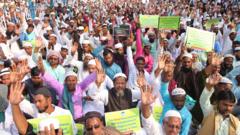In India, a contentious proposal to amend the laws governing waqf properties—donated by Muslims over centuries—has sparked significant protests among various Muslim groups. The proposed changes, which include more than 40 amendments to the existing waqf law, aim to address concerns of corruption and mismanagement but are widely regarded as politically motivated attempts to weaken minority rights, especially by Prime Minister Narendra Modi's Hindu nationalist government.
Waqf properties consist of mosques, madrassas, orphanages, and extensive land holdings, and are traditionally viewed as religious donations to benefit the Muslim community. The proposed bill seeks to reintroduce changes after initial suggestions from a parliamentary committee, which is now requesting additional time to finalize its recommendations. The government's rhetoric emphasizes reform demands from the Muslim community to tackle corruption within waqf boards—characterized as among the country's largest landholders.
While some Muslims acknowledge the pressing need for reform due to issues like encroachment and low revenue generation from waqf properties, skepticism prevails regarding the implementation of these amendments. The 1995 Waqf Act established local boards to manage these properties, but there are concerns that amendments could alter long-standing ownership rules that have historically protected many community properties that lack formal documentation.
Critics point to problematic changes, notably the removal of the "waqf by user" provision which recognized oral donations. The revisions leave many historical sites—including mosques and dargahs—vulnerable, as identifying rightful ownership amidst century-old management shifts becomes increasingly complex. Academics suggest that these developments not only threaten Muslims' control over waqf properties but also reflect a larger agenda of majoritarian control.
Further amendments require waqf boards to register with district authorities, raising fears that this undermines their longstanding autonomy. Prominent political voices like Asaduddin Owaisi have denounced these proposals as attempts to strip Muslims of their land and threaten historical dargahs and mosques.
Even while acknowledging the need for reform in managing waqf properties efficiently, Muslim groups insist that any changes must prioritize community interests and be approached with sensitivity. Critics argue that while the diagnosis of the problems is correct, the proposed solutions could lead to detrimental consequences for the Muslim community in India.




















